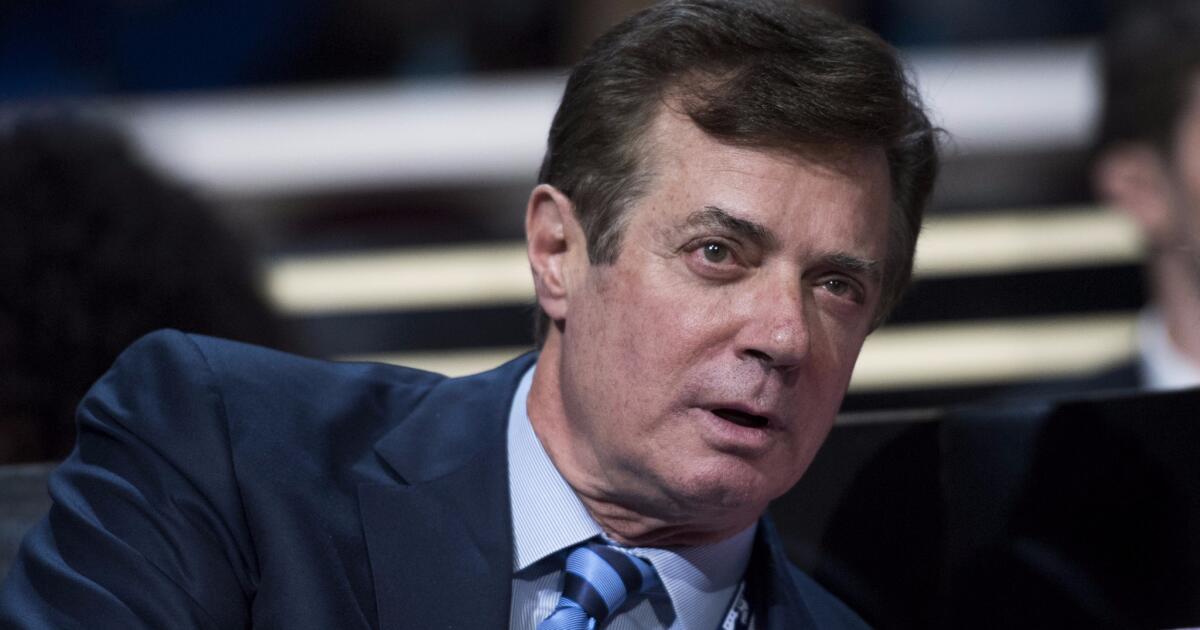Reporting from Washington — An FBI raid last month at one of the homes of Donald Trump’s former campaign manager, Paul Manafort, provides the clearest evidence so far that special counsel Robert S. Mueller III is aggressively pursuing the investigation into the campaign’s dealings with Russia and that his inquiry includes possible financial wrongdoing by Manafort.
Agents served a warrant early in the morning on July 26 at the Alexandria, Va., home of Manafort, a lobbyist with a long background of ties to pro-Russia politicians, according to Jason Maloni, a spokesman for Manafort.
“Mr. Manafort has consistently cooperated with law enforcement and other serious inquiries and did so on this occasion as well,” Maloni said in a statement about the raid, which was first reported Wednesday morning by the Washington Post.
The search, conducted by FBI agents working on the case supervised by Mueller, sought records related to foreign bank accounts and foreign registrations, according to a person familiar with the investigation who spoke on condition of anonymity to comment on the probe.
The federal Bank Secrecy Act requires Americans to file disclosure forms with the government if they have foreign bank accounts valued at more than certain threshold amounts. Penalties for violation can run as high as 10 years in prison if the offense is especially serious.
The search showed that Mueller, who is working with a grand jury in Washington, has amassed enough evidence to justify a warrant seeking records. Unlike subpoenas, which a grand jury can issue on its own, a warrant requires prosecutors to persuade a judge that probable cause exists to believe that a crime may have been committed.
The search provides the first clear public confirmation that Mueller’s investigation now includes questions about Manafort’s complicated finances. Manafort has not been accused of any wrongdoing.
The specific allegations that Mueller’s prosecutors are pursuing are not known, but in major investigations involving multiple potential subjects, a standard technique is to use charges against some possible perpetrators to persuade them to testify against others.
The raid came on July 26, the day that Manafort had been scheduled to testify before the Senate Judiciary Committee, which is also investigating the Trump campaign’s possible collusion with Russian attempts to influence the 2016 election. That appearance was called off after Manafort agreed to provide the committee with records. The previous day, Manafort answered questions behind closed doors from staff of the Senate Intelligence Committee.
Manafort has continued to cooperate with the Judiciary panel’s investigation, according to committee spokesman George Hartmann. His lawyers turned over 400 pages of documents, including his foreign agent filing, on Aug. 2. Manafort’s lawyers are still discussing the terms for a closed-door interview with committee investigators.
The committee also received 20,000 pages of records from the Trump campaign last week, along with 250 pages from Donald Trump Jr., Hartmann said. The committee is still seeking records from the Trump Organization.
People close to Manafort complained that the raid was unnecessary because he had already agreed to turn over his records. A spokesman for Mueller declined to comment.
White House spokeswoman Sarah Huckabee Sanders declined to answer questions about the search, referring questions to Manafort’s attorneys.
Manafort ran Trump’s campaign during a pivotal period leading up to the Republican convention last summer. In June 2016, Manafort attended a meeting at Trump Tower that was set up by Donald Trump Jr., who forwarded Manafort an emailed invitation to get research on Hillary Clinton that he had been told was provided by the Russian government. “Russia-Clinton-private and confidential,” the subject line read.
Trump’s son in law, Jared Kushner, also attended the New York meeting with a Russian lawyer, Natalia Veselnitskaya and four others, including a lobbyist who once worked with Soviet army intelligence and a longtime aide to an influential Russian oligarch. Manafort had agreed to turn over notes of that meeting to congressional investigators.
During the Republican convention in Cleveland, the Trump campaign worked to soften a plank in the party platform that originally called for the U.S. to provide weapons to Ukraine to fight pro-Russia forces.
Manafort was forced to leave the campaign after investigators in Ukraine said they were looking into allegations that he had been secretly paid more than $12 million by a political party connected to former Ukraine President Viktor Yanukovych, a pro-Kremlin figure who was driven from office by a popular uprising in 2014.
Manafort, who worked for Yanukovych for more than a decade, announced in April that he was belatedly registering as a foreign agent.
In addition to allegations related to the campaign and transactions involving Manafort’s work overseas, the FBI separately has been investigating real estate deals involving Manafort and his son-in-law, Jeffrey Yohai, including Los Angeles ventures involving actor Dustin Hoffman and his son Jacob.
The FBI has spoken to Yohai in hopes that he would cooperate and testify against Manafort, Maloni said. But he said the son-in-law has no information about Manafort’s other business dealings. A lawyer for Yohai declined to comment.
Tanfani reported from Washington and Bierman from Bridgewater, N.J.
Twitter: @jtanfani
ALSO
Pence’s sensitivity to talk of 2020 speaks to White House insecurity
White House shifts tone on Obamacare repeal, signals openness to bipartisan ‘fix’
Trump emphasizes tough law enforcement in comments on opioid epidemic
UPDATES:
2:05 p.m.: This article was updated with additional details about the search and reaction.
This article was originally published at 11 a.m.
